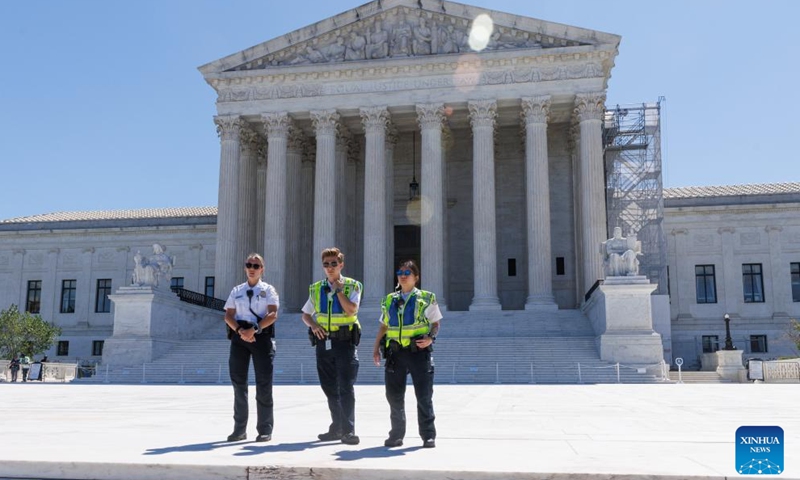US supreme court's ruling of Trump's broad immunity could spark further controversy, highlights politicization of American judicial system: experts

Police officers stand guard in front of the U.S. Supreme Court in Washington, D.C., the United States, on July 1, 2024. U.S. Supreme Court on Monday ruled that former President Donald Trump, the presumptive Republican nominee, has some immunity from criminal charges for trying to reverse the 2020 election results, which makes a trial before election unlikely. Photo: Xinhua
The US Supreme Court's ruling that former presidents have broad immunity from criminal prosecution for official acts gave what former president Donald Trump, the first to be convicted of felony crimes, wants to prevent him from facing trial or being sentenced before the November election, analysts said. They predict that the decision, amid intensifying partisan competition between the Republican and Democratic parties, will provoke further controversy, highlighting the politicization of the American judicial system and deepening societal divisions.
On Monday, the US Supreme Court decided that Trump cannot be prosecuted for actions he took within his constitutional powers as president. Chief Justice John Roberts wrote the majority opinion in a 6-3 ruling that overturned a lower court's decision denying Trump's claim of immunity from federal criminal charges related to his efforts to overturn the 2020 election results, according to a Reuters report.
The ruling, with six conservative justices in agreement and three liberal justices dissenting, marks the first instance since the founding of the US that the Supreme Court has affirmed immunity for former presidents from criminal charges. Notably, three of the court's conservative justices were appointed by Trump.
The ruling, which provides an explanation of presidential immunity, could however spark more controversy at the federal constitutional level against the backdrop of the upcoming November election. The ruling also appears to have significant political implications, reflecting the politicization and instrumentalization of the American judicial system by political parties, Diao Daming, a professor at the Renmin University of China in Beijing, told the Global Times on Tuesday.
After the ruling was issued, Biden on Monday said the top court had done a "terrible disservice" to the American people and the ruling is "a dangerous precedent" because the power of the presidency will no longer be constrained by the law. Trump, however, hailed the ruling and wrote in a social media post in capital letters that "BIG WIN FOR OUR CONSTITUTION AND DEMOCRACY. PROUD TO BE AN AMERICAN!" according to media reports.
The ruling aligns with Trump's strategy to delay the trials he faces for as long as possible, including those related to hush money and the investigation into his handling of classified documents. If he wins the election in November, none of these legal processes would proceed further, Diao said.
Diao noted that the Democratic Party will not cease emphasizing Trump's "criminal liability" and will continue to exploit these legal charges to influence public opinion. However, this strategy may have limited impact on the election outcome as Republicans are also focusing on Biden's age and fitness especially after his "disastrous" performance in the first presidential debate with Trump.
In the current polarized political climate, voters may not alter their support for their respective party nominees, said Diao, noting that trust levels among party voters towards their own candidates may not be high, but their disdain towards the opposing candidates remains significant.
The upcoming election is seen as a showdown between the incumbent president and a former president, representing two distinct sets of American policy directions. This confrontation could deepen divisions within American society and worsen political chaos, analysts said.
Judicial factors have played a significant role in the election, highlighting not just the politicization of the American judicial system but also demonstrating how the judiciary serves as a tool in partisan disputes. This also further exposes problems within the American political system, said Diao.